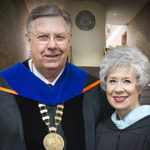In the decades surrounding Baylor University’s founding, Texas Baptists reflected the prevailing culture—including support for slavery, three historians agreed during an online forum sponsored by the university.
Last summer, Baylor’s board of regents passed a resolution acknowledging the university’s founders and most of its initial trustees were slaveholders. The historians who participated in the March 9 online discussion emphasized Baylor was not alone in that regard.
‘Captive to culture’

Bill Leonard, founding dean of Wake Forest University’s School of Divinity, noted the university where he served—along with Furman University, Mercer University and Southern Baptist Theological Seminary, among other institutions—all carry that same “stain” on their history.
“We can’t repent for them, but in many ways we repent because of them,” Leonard said, regarding the institutions’ slaveholding founders. “They were captive to culture, as we all are.”
Fellow panelists Mike Williams from Dallas Baptist University and Mekala Audain from The College of New Jersey agreed, noting educational institutions in the North—and the nation itself—also include slaveholders as key founding figures.
‘People with feet of clay’
“Every person, regardless of the time they live in, the culture they are part of—we all are people with feet of clay,” Williams said, adding it should create “a spirit of humility” in each individual.

Slaveholders naturally were among the key donors to institutions in Texas and the rest of the South, he added.
“The people with the money in the South were the slaveholders,” he said.
The availability of fertile land conducive to growing cotton created a society in Texas that benefitted economically from slavery—and churches often offered justification for that system, Williams noted.
Sign up for our weekly edition and get all our headlines in your inbox on Thursdays
“When you are benefitting—not only you but the people around you are benefitting economically—it’s really easy to make excuses for things that are wrong, things that are evil,” he said.
Major figures in religious and institutional life had “huge blind spots” regarding slavery, Williams observed. For example, he noted, Judge R.E.B. Baylor held 33 slaves and complained on the eve of the Civil War about a half-dozen of his slaves who had run away.
In Texas, runaway enslaved people typically fled to Mexico rather than to the North, and they more likely received assistance from Tejanos than from white Texans, Audain noted.
Some Texas Baptists, such as Sam Houston, opposed secession from the Union. Among that group, a small number may have opposed slavery, but hardly any spoke against it in the mid-1800s.
Williams pointed to one notable exception—Freeman Smalley, founder of Union Baptist Church in Williamson County, an abolitionist congregation.
“The church obviously didn’t grow very much,” Williams acknowledged.
White Christians used Scripture to justify slavery
All three historians pointed to the ways white Christians used the Bible to justify slavery and keep enslaved people subservient to slaveholders.
“It is extremely important to know how deeply Baptists and other American Christians anchored their support for slavery in Scripture. … Baptists took the Bible and used the Bible to support the cultural practice (of slavery) in which they found themselves,” Leonard said.
After the Civil War and Reconstruction, the veneration of Confederate heroes became part of the “Lost Cause” mythology that allowed white Southerners to view themselves as more noble, moral and religious even in defeat than people in the North, he noted.
The “Lost Cause” and its embrace by white Southern Christians also offered justification for continued oppression of Black Americans, including Jim Crow laws and lynching, he added.
The March 9 discussion about slavery and early Texas Baptists marked the second in the three-part online “Baylor Conversation Series: Perspectives on Our History.” The first forum on March 2 explored slavery in America, and the final panel discussion on March 16 specifically will examine Baylor’s history.
Baylor created the forum series to allow a larger audience to explore many of the same issues the university’s Commission on Historic Campus Representation spent several months examining and discussing.
Regents created the commission to review Baylor’s history and offer recommendations on how to present it honestly, including how the university deals with on-campus statues, monuments and buildings that recognize individuals linked to racial injustice. The regents accepted the commission report at their February meeting and will release the full report to the general public later this month, after the three online discussions.














We seek to connect God’s story and God’s people around the world. To learn more about God’s story, click here.
Send comments and feedback to Eric Black, our editor. For comments to be published, please specify “letter to the editor.” Maximum length for publication is 300 words.